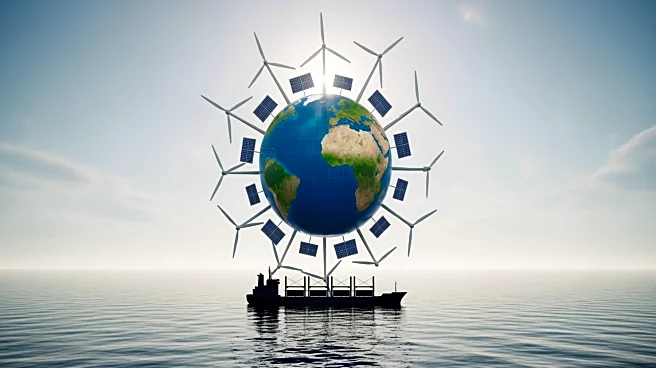What's Happening?
Recent analysis highlights the impact of geopolitical risks on global shipping decarbonization efforts. The study, utilizing sentiment analysis and the Geopolitical Risk Index, reveals a decline in decarbonization attitudes post-2019 due to geopolitical tensions.
Events such as the Russia-Ukraine conflict and the Nord Stream pipeline explosion have exacerbated negative trends, affecting nations' willingness to collaborate on decarbonization initiatives. The shipping industry's attitude towards decarbonization improved after 2018, driven by international green shipping policies and investments. However, geopolitical risks have led to a slowdown in momentum, particularly in the Global North, where heightened risks coincide with diminished commitment to decarbonization.
Why It's Important?
The findings underscore the complex relationship between geopolitical risks and environmental priorities, highlighting the challenge of sustaining decarbonization efforts amid global crises. The decline in decarbonization attitudes could slow technological development and investment in green shipping technologies, impacting global climate goals. Countries with high trade dependence may deprioritize decarbonization efforts, leading to increased emissions and reliance on carbon-intensive trade routes. This trend poses a significant challenge to achieving international climate targets and underscores the need for strengthened climate policies to counteract external risks.
What's Next?
The study suggests that climate policies need continuous strengthening and monitoring to effectively counteract geopolitical risks. Nations may need to reassess their decarbonization strategies and prioritize collaboration to mitigate the impact of geopolitical tensions. The shipping industry could explore alternative routes and technologies to reduce emissions and enhance resilience against geopolitical disruptions. Stakeholders may advocate for international agreements and initiatives to support decarbonization efforts and address the challenges posed by geopolitical risks.
Beyond the Headlines
The study highlights the ethical and cultural dimensions of decarbonization efforts, revealing how national characteristics influence responses to geopolitical risks. Countries with higher economic development and openness may scale back decarbonization ambitions, while those facing social and political pressures prioritize stability. The findings emphasize the need for tailored approaches to decarbonization that consider national contexts and geopolitical dynamics.















